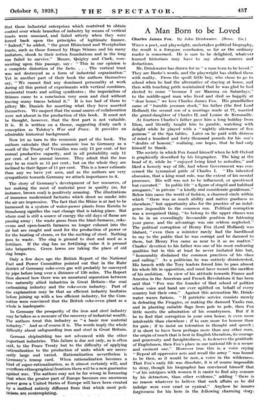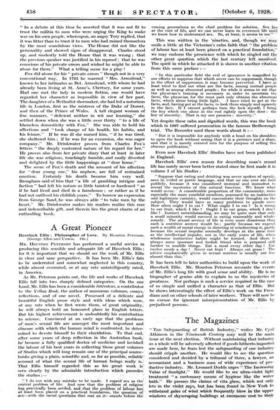A Man Born to be Loved
Charles James Fox. By John Drinkwater. (Berm. 25s.) WHEN a poet, and playwright, undertakes political biography, the result is a foregone. conclusion, so far as the ordinary
reader is concerned. He is sure to be delighted, whatever learned historians may have to say about sources and deductions.
Mr. Drinkwater has drawn for us " a man born to be loved?' They are Burke's words, and the playwright has clothed them with reality. From the spoilt little boy, who chose to go to school when he had the alternative of staying at home, and then with touching pride maintained that he was glad he had elected to come " because I see Mamma on Sattirdays," to the middle-aged man who lived and died so happily at " dear home," we love Charles James Fox. His grandfather came of " humble yeoman stock," his father (the first Lord Holland) the second son of a marriage made at '77, married the grand-daughter of Charles II. and Louise de Keronaille. At fourteen Charles's father gave him a long holiday from Eton, and literally taught him to gamble, watching with delight while he played with a " nightly allowance of five guineas " at the Spa tables. Later on he paid with distress of mind a hundred and forty thousand pounds for his son's " deubts of honour," realizing, one hopes, that he had only himself to thank.
The society in which Fox found himself when he left Oxford is graphically described by his biographer. The king at the head of it, while he " enjoyed being kind to nobodies," and liked a homely way of life, had where Government was con- cerned the tyrannical pride of Charles I. " His inherited obsession, that a king must rule, was the extent of his mental processes. His will was not to be influenced, or questioned but executed." In public life " a figure of stupid and habitual arrogance," in private " a kindly and considerate gentleman."
Below him came the world of fashion, a charmed circle within which " there was as much ability and native goodness as elsewhere," but opportunity also for the practice of an indul- gence impossible to the common run. Political corruption was a recognized thing, " to belong to the upper classes was to be in an exceedingly favourable position for fattening your purse, and the advantage was one seldom neglected." The political corruption of Henry Fox (Lord Holland) was blatant, " even then a minister rarely had the hardihood to say to the public that he was corrupt and be damned to them, but Henry Fox came as near to it as no matter."
Charles' devotion to his father was one of his most endearing qualities but in this at least he never imitated him but, " honourably disdained the common practices of his class and calling." As a politician he was entirely disinterested.
His breach with the Tory leaders forced him to pass almost his whole life in opposition, and must have meant the sacrifice of his ambition. In view of his attitude towards France and America in the American and French Revolutions it has been said that " Fox was the founder of that school of politics whose voice and hand are ever uplifted on behalf of every country but their own." Against this accusation Mr. Drink- water waxes furious. If patriotic service consists merely in defeating the Froggies, or making the damned Yanks run, and in planting suitable flags from pole to pole, then Fox little merits the admiration of his countrymen. But if it be to find that corruption in your own house, is even more intolerable than elsewhere ; if to care more for honour than for gain ; if to insist on toleration in thought and speech ; if in short to have been perhaps more than any other man, the origin of much that is best in English liberalism, its courage and generosity and farsightedness, is to deserve the gratitude of Englishmen, then Fox's place in our national life is a secure and eminent one." However true this is, a voice crying " Repeal all oppressive acts and recall the army " was bound to be then, as it would be now, a voice in the wilderness. That Fox's early life was dissolute, it is of course impossible to deny, though his biographer has convinced himself that " of his intrigues with women it is easier to find airy censure by his detractors, than other evidence," adding " there is no reason whatever to believe that such affairs as he did indulge were ever cruel or cynical." Anyhow he insures forgiveness for his hero in the following charming story.
" In a debate at this time he asserted that it was not fit to trust the militia to men who were urging the King to make war on'his own people, whereupon, an angry Tory replied, that it-was fitter than to trust it to men who had ruined themselves by the most scandalous vices. The House did not like the personality and showed signs of disapproval. Charles stood up, and modestly told the House that it was wrong ; that the previous speaker was justified in his reproof ; that he was conscious of his private errors and wished he might, be able to atone for them." What a telling scene for a play !
Fox did atone for his "private errors " though not in a very conventional way. In 1795 he married " Mrs. Armsitead,", known to her intimates as Bet. Armsitead, with whom he had already been living at St. Anne's, Chertsey, for some years. Had one met the lady in modern fiction, one would have regarded her character as impossible in view of her past. The daughter of a Methodist shoemaker, she had led a notorious life in London, first as the mistress of the. Duke of Dorset, and then of the Prince of Wales. A tall elegant woman of fine manners, " deficient neither in wit nor learning," she settled down when she was a little over thirty " to a life of blameless domesticity with Fox." She was able to hold his affections and "took charge of his health, his habits, and his leisure." If he was ill she nursed him, " if he was tired, she sheltered him ; if he was for an excursion, she was eager company." Mr. Drinkwater proves from Charles Fox's, letters " the deeply contented nature of his regard for her." He proves also from her private diary that at least in later life she was religious, touchingly humble, and easily diverted and delighted by the little happenings at " dear home."
The scene of Fox's death and the account of his affection for " dear young one," his nephew, are full of restrained emotion. Certainly his death became him very well. Brougham said of him that "a life of gambling intrigue and faction " had left his nature as little tainted or hardened " as if he had lived and died in a farmhouse ; or rather as if he had not outlived his childish years." To borrow an expression from George Sand, he was always able " to take men by the heart." Mr. Drinkwater makes his readers realize this rare and indescribable gift, and therein lies the great charm of an enthralling book.























































 Previous page
Previous page